|
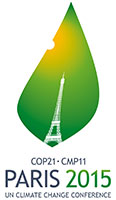 International leaders have reached a pact to keep global warming "well under" two degrees, and "pursue efforts" to limit temperature rises to 1.5 degrees. French foreign minister Laurent Fabius, Chair of COP 21, said the deal would be legally-binding, and that targets would be reviewed every five years.
International leaders have reached a pact to keep global warming "well under" two degrees, and "pursue efforts" to limit temperature rises to 1.5 degrees. French foreign minister Laurent Fabius, Chair of COP 21, said the deal would be legally-binding, and that targets would be reviewed every five years.
As part of a concerted effort to avoid catastrophic climate change, the world's governments unanimously committed to an ongoing effort of increasingly deeper emissions reductions aimed at keeping total warming "to well below 2°C [3.6°F] above preindustrial levels." The full text of this Paris Agreement goes even further, with the parties agreeing "to pursue efforts to limit the temperature increase to 1.5°C above preindustrial levels, recognizing that this would significantly reduce the risks and impacts of climate change."
"Canada has reasserted itself on the world stage by playing a strong role in developing the historic Paris agreement to curb the climate threat facing us all," said Anthony Swift, Canada Project Director at NRDC.
NRDC president Rhea Suh, said that a new Paris deal would help Canada's U.S. neighbours clean up their cars, trucks and power plants, invest in energy efficiency and transition to solar and wind energy sources. However, she warned that all countries that are major carbon polluters had to do their part to curb their emissions footprint.
"A crisis that took centuries to get here won't go away overnight. But climate change has met its match in the collective will of a united world. Our challenge now, in our country and all others, is to make good on the promise of Paris, by turning the action we've pledged into the progress we need," said Suh.
The historic agreement, known as the Paris Agreement (under the UNFCC), includes emissions-slashing commitments from individual countries and promises to help poorer nations adapt to the damaging effects of a warming world. Negotiators also agreed on measures to revise, strengthen, and scrutinize countries' contributions going forward. Warnings about the country emission reduction targets needing to increase have alerted all signatories.
Merran Smith, executive director of Clean Energy Canada, described the Paris goal of 1.5 degrees C as "encouraging," but warned that an accelerated transition to renewable power was vital if such an ambitious deal was to succeed.
"Renewable energy represents a major economic opportunity that is gaining traction around the world. The leadership, innovation and enthusiasm for climate solutions we've seen in Paris sends a signal to world markets that the age of fossil fuels is ending and giving way to a more sustainable, resilient and clean economy. Canada will find itself in good company as it aspires to be a leader in the clean energy transition," said Smith.
"This is a tremendous victory for all our citizens," said Secretary of State John Kerry during the final session of the summit. "It's a victory for all of the planet and for future generations."
The Paris Agreement means the world may avoid many of the most catastrophic impacts. That said, a quarter century of largely ignoring scientific warnings has left the world unable to stop a number of very dangerous impacts, including sea level rise, ocean acidification, extreme weather, and Dust-Bowlification.
"I'm optimistic within a pessimistic framework," said David Doniger the Director of the Natural Resources Defense Council's Climate & Clean Air Program. His words summed up how many of the people at COP 21 feel after two long weeks of negotiations.
The Paris Agreement means world leaders are committed to responding to dire scientific warnings about impacts of climate change. Rising concentrations of carbon dioxide in the atmosphere from burning fossil fuels and other human activities are threatening to usher in an era of rising sea levels, sinking islands, scorching heat waves, devastating droughts, mass human migration, and destruction of ecosystems.
"At last, a historic international agreement on climate change has been finalized. Now it's up to citizens and their governments to ensure a safe future, free from catastrophic climate impacts. And that means Canada has work to turn its strong words in Paris into actions at home," said Tim Gray, executive director of Environmental Defence.
To help avoid catastrophic climate change and keep global warming within 1.5 degrees C, Gray said Canada had to roll out a new federal climate framework within the next 90 days aimed at total decarbonisation by 2050.
The reduction targets in the Paris Agreement will be brought in line with what scientists say needs to happen, and most importantly this deal strikes a balance between what has to happen to avoid the most calamitous impacts of climate change, with the realties faced by developing nations that do not have the resources to go it alone in reducing fossil fuel consumption.
Environment & Climate Change Minister Catherine McKenna, who had a prominent role at COP 21 being named a facilitator by French Foreign Minister Laurent Fabius, said the deal shows multilateralism works and that countries can come together for a common purpose and for the better of future generations.
"It sets the international framework," Christine McKenna, Canada's Environment and Climate Change minister, said. 'We need to be ambitious now in Canada too.'
View December 14, 2015 National Observer article
View December 13, 2015 The Guardian article
View December 12, 2015 National Observer article
View December 12, 2015 DeSmog Blog article
View December 12, 2015 National Observer article
View December 12, 2015 Environmental Defence article
View December 12, 2015 Mother Jones article
View December 12, 2015 Climate Action Network Canada article
View December 12, 2015 Adoption of the Paris Agreement
View December 12, 2015 National Observer article
View December 12, 2015 Climate Progress article
View June 24, 1988 The New York Times article
View Paris Agreement - Comparison of the final draft with the previous draft
View Climate Action Network Canada news page
View Climate Action Network International Paris Climate Summit page
View United Nations Framework Convention on Climate Change Kyoto Protocol page
Visit Climate Action Network International website
Visit Intergovernmental Panel on Climate Change article
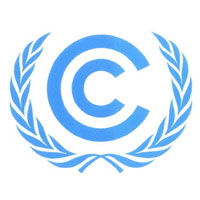 The first week of Paris United Nations negotiations for a new international climate agreement is over. Environment ministers from many of the 190 countries attending are participating in week two negotiations.
The first week of Paris United Nations negotiations for a new international climate agreement is over. Environment ministers from many of the 190 countries attending are participating in week two negotiations.
The international response to climate change began at the Rio Earth Summit in 1992, where the 'Rio Convention' included the adoption of the UN Framework on Climate Change (UNFCCC). This convention set out a framework for action aimed at stabilising atmospheric concentrations of greenhouse gases (GHGs) to avoid "dangerous anthropogenic interference with the climate system."
The UNFCCC entered into force on 21 March 1994, and now has a near-universal membership of 195 parties. The main objective of the annual Conference of Parties (COP) is to review the Convention's implementation. The first COP took place in Berlin in 1995 and significant meetings since then have included COP3 where the Kyoto Protocol was adopted, COP11 where the Montreal Action Plan was produced, and the 2010 COP15 in Copenhagen where an agreement to success Kyoto Protocol was unfortunately not realised. COP17 in Durban reached agreement to create the Green Climate Fund.
The first UNFCCC COP took place in Berlin in 1995, but the talks have not consistently provided results. Countries, in recent COPs have not agreed on a fair way to tackle the 2 degrees Celsius ceiling for global warming. Few countries, including Canada, are actually fulfilling targets and commitments to reduce emissions.
For the first time in years of UN negotiations, the EU aims to achieve a new legally binding and universal agreement on climate at COP21 in Paris. France, as host & chair for COP 21, is responsible for delivery of a consensus agreement by December 10, 2015.
Current key issues at COP 21 defining negotiations for language in a new climate agreement include civil rights, indigenous rights, the actual temperature goal to aim for, and the role of 'non parties' who do not sign a new UN agreement. These include cities, non government organizations, and sub national provinces, states, countries, etc.
Visit COP 21 website
View COP 20 Presses for Climate Agreement
View November 27, 2015 EcoWatch article
View Green Party of Canada videos
View 350.org The Plan Through Paris page
View November 27, 2015 EcoWatch article
View December 3, 2015 The Guardian article
View December 3, 2015 The Guardian article
View Manitoba Wildlands International Climate Meetings page
 The latest round of climate talks just concluded in Lima, Peru (COP 20) after two days of overtime negotiations. A new document was created, the Lima Call for Climate Action that sets up framework for negotiations on a new climate treaty that will be decided in Paris next year. A binding global climate treaty that supports real change will depend on reaching agreements with the 20 nations that emit 80% of total global greenhouse emissions (GHG), and the economic sectors that have the biggest impact on the world’s climate.
The latest round of climate talks just concluded in Lima, Peru (COP 20) after two days of overtime negotiations. A new document was created, the Lima Call for Climate Action that sets up framework for negotiations on a new climate treaty that will be decided in Paris next year. A binding global climate treaty that supports real change will depend on reaching agreements with the 20 nations that emit 80% of total global greenhouse emissions (GHG), and the economic sectors that have the biggest impact on the world’s climate.
Included in the text coming out of Lima is a goal of phasing out carbon emissions by mid-century, which was supported by over 100 countries. That this made it out of the COP 20 in Lima is significant. The only way to achieve this scenario is by moving away from fossil fuels - this pits the UNFCCC process directly against the fossil fuel industry.
The Lima Accord is different from other negotiations, because for the first time all nations agreed to cut carbon emissions. Each country is going to report how they will make this happen. However a big problem with the language means that participating nations will not be held accountable for reporting their plans – it’s as if each country “will be marking their own homework ahead of the critical Paris meeting.”
Elizabeth May was the only Canadian opposition elected representative attending COP 20 in Lima, Peru.
View 350.org article
View December 19, 2014 DeSmog Canada article
View December 16, 2014 The Tyee article
View December 15, 2014 Elizabeth May article
View December 13, 2014 CBC Radio article
View December 15, 2014 Democracy Now! article
View September 23, 2014 United Nations Development Programme article
 This December, 195 nations plus the European Union are meeting in Lima for two weeks for the crucial UN Conference of the Parties on Climate Change, known as COP 20. They aim to draft language for the next international climate agreement.
This December, 195 nations plus the European Union are meeting in Lima for two weeks for the crucial UN Conference of the Parties on Climate Change, known as COP 20. They aim to draft language for the next international climate agreement.
International political response to climate change began with the adoption of the United nations Framework Convention on Climate Change (UNFCCC) in 1992, which sets out a framework for action aimed at stabilising atmospheric concentrations of greenhouse gases (GHGs) to avoid dangerous anthropogenic interference with the climate system.” The Convention, which entered into force on 21 March 1994, now has 195 parties.
The importance of this Lima, Peru event lies not only in the progress of international agreements, but also in the public's interest and power to give a voice to key stakeholders including scientists and communities that are vulnerable to the impacts of climate change.
Behind each negotiation protocol signed once a year, there is an ongoing effort on the part of researchers, NGOs, the private sector, local governments and communities to integrate climate adaptation and mitigation in the fabric of people's everyday lives.
Technology transfer, balancing the need for international actions and locally appropriate interventions, and designing effective adaptation programmes are among the practical issues key to negotiating and enforcing international treaties.
Success in Lima will depend in part on Peru's Environment Minister Manuel Pulgar-Vidal. As official president of COP 20, Pulgar-Vidal's determination and energy will be crucial, most observers believe.
Climate change is a major issue in Peru, since Lima and many other parts of the country are dependent on freshwater from the Andes glaciers. Studies show they have lost 30 to 50 per cent of their ice in 30 years and many will soon be gone.
View December 3, 2014 Huffington Post article
View December 1, 2014 Prevention Web article
View December 1, 2014 CBC News article
View November 28, 2014 Greenpeace article
View November 26, 2014 Rabble.ca article
Visit UNFCCC Lima Climate Change Conference website
Visit Lima Climate Change Conference website
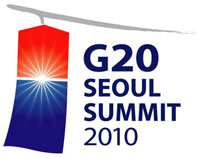 In advance of the November 2010 G20 meeting in South Korea, the G20 meeting in South Korea 18 leading Canadian organizations called on Prime Minister Harper and Minister Flaherty to follow through on their G20 promise to end tax breaks to fossil fuel companies.
In advance of the November 2010 G20 meeting in South Korea, the G20 meeting in South Korea 18 leading Canadian organizations called on Prime Minister Harper and Minister Flaherty to follow through on their G20 promise to end tax breaks to fossil fuel companies.
Climate Action Network Canada launched an "Open Letter to Prime Minister Harper and Minister Flaherty: An appeal to end special tax breaks to oil, coal and gas companies" on November 10, 2010, encouraging organizations to sign-on in the lead up to the 2011 federal budget.
"Prime Minister Harper hands out more money in tax breaks to oil and gas companies every year than the entire operating budget of Environment Canada," says Steven Guilbeault of Equiterre. "This is part of a broader recklessness that this government demonstrates in terms of dealing with climate change."
"Canadian governments give kind words to those who reduce pollution gases and cold, hard cash to oil companies for increasing pollution and greenhouse gases," added Greenpeace climate and energy campaigner, Keith Stewart.
The open letter follows the release of several studies that quantify the cost of subsidies to fossil fuel companies. A November 2, 2010 report by the International Institute for Sustainable Development pegged the value of Canadian subsidies at $2.84 billion (CAD) per year.
A November 9, 2010 International Energy Agency (IEA) report estimates that all told G20 Nations provide $312-billion (USD) in annual support to the fossil fuel industry.
"Fossil-fuel subsidies result in an economically inefficient allocation of resources and market distortions, while often failing to meet their intended objectives," said the IEA in its 2010 World Energy Report.
View November 10, 2010 Climate Action Network Canada news release
View November 10, 2010 Climate Action Network Canada, Open Letter to Prime Minister Harper and Minister Flaherty
View November 10, 2010 Globe and Mail article
View 2010 International Energy Agency World Energy Report
View November 9, 2010 Manitoba Wildlands news item
Source: Climate Action Network
 The fourth round of the 2010 United Nations (UN) climate change negotiations took place October 4th to 9th in Tianjin, China. The Tianjin UN Climate Change Conference is designed to prepare draft outcomes the for UN Climate Change Conference in Cancun, Mexico November and December 2010. The fourth round of the 2010 United Nations (UN) climate change negotiations took place October 4th to 9th in Tianjin, China. The Tianjin UN Climate Change Conference is designed to prepare draft outcomes the for UN Climate Change Conference in Cancun, Mexico November and December 2010.
During the meetings in Tianjin, participating delegates discussed long-term shared visions for international climate change work, abilities to adapted to the effects of climate change, reducing greenhouse gas emissions, key operational elements of climate finance and capacity building, and the future of the Kyoto Protocol. Discussions in Tianjin will be continued in Cancún later this year.
Government delegates also discussed negotiating text under the Ad Hoc Working Group on Long-term Cooperative Action under the Convention (AWG-LCA). This negotiating group, comprising all 194 Parties to the United Nations Framework Convention on Climate Change (UNFCCC), are working on delivering a long-term global solution to the climate challenge.
The Ad Hoc Working Group on Further Commitments for Annex I Parties under the Kyoto Protocol (AWG-KP) met in Tianjin in parallel to the AWG-LCA. This group works on emissions reduction commitments from the 37 industrialized countries committed to the Kyoto Protocol beyond 2012.
"During the course of negotiations this year, governments have been converging on the need to establish a full set of ways and means to launch a new wave of global climate action," said UNFCCC Executive Secretary Christiana Figueres. "In Tianjin, governments will need to cut down the number of options they have on the table, identify what is achievable in Cancun and muster the political compromises that are needed for concrete outcomes," she adds.
The UNFCCC sessions were attended by over 2,500 participants from more than 176 countries, including government delegates, representatives from business and industry, civil society organizations and research institutions.
The sixteenth Conference of the Parties (COP 16) and the sixth Conference of the Parties serving as the meeting of the Parties to the Kyoto Protocol (CMP 6) will be held in Cancun, Mexico, November 29th to December 10th, 2010.
View UNFCCC - Tianjin, China Meetings
View Climate Action Network Tianjin Climate Talks Webpage
View October 5, 2010 TckTckTck article
View October 9, 2010 The Guardian article
View October 2010 IISD Reports on Earth Negotiations
 Download September 28, 2010 UNFCCC press release (PDF) Download September 28, 2010 UNFCCC press release (PDF)
 Download October 9, 2010 UNFCCC press release (PDF) Download October 9, 2010 UNFCCC press release (PDF)
 Download October 12, 2010 IISD Earth Negotiations Bulletin (PDF) Download October 12, 2010 IISD Earth Negotiations Bulletin (PDF)
 Download October 2010 Climate Action Network International report (PDF) Download October 2010 Climate Action Network International report (PDF)
Source: UNFCCC, TckTckTck, Climate Action Network
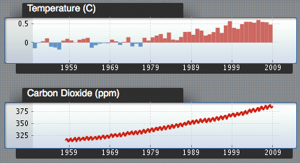 View the full NOAA Global Climate Dashboard View the full NOAA Global Climate Dashboard
Also View ClimateInteractive Scoreboard widget
 Delegates representing governments, intergovernmental and non-governmental organizations, academia, private sectors and media met three times in Bonn Germany between April and August 2010 to negotiate climate treaty language in advance of December 2010 Conference of the Parties negotiations. These bring together draft language for specific treaty contents in the lead up to the next United Nations Framework Convention on Climate Change (UNFCCC)sessions in Cancún, Mexico, November 29-December 10 2010. The negotiations are to prepare for the expiration of the Kyoto Protocol in 2012. Delegates representing governments, intergovernmental and non-governmental organizations, academia, private sectors and media met three times in Bonn Germany between April and August 2010 to negotiate climate treaty language in advance of December 2010 Conference of the Parties negotiations. These bring together draft language for specific treaty contents in the lead up to the next United Nations Framework Convention on Climate Change (UNFCCC)sessions in Cancún, Mexico, November 29-December 10 2010. The negotiations are to prepare for the expiration of the Kyoto Protocol in 2012.
A document, Text to facilitate negotiations among Parties, dated July 9, 2010, was circulated in advance of sessions in Bonn August 2-6. China, the US, Bolivia and others, added more than 40 pages into the draft text at the meeting in August. This additional text will now be laboriously negotiated line by line at the next meeting in Tianjin, China October 4-9, 2010. Only six days of official negotiation remain before the Cancun Convention.
"We cannot afford these snail-paced negotiations and they must speed up, or we'll lose all momentum in this process," stated Gordon Shepherd, Leader of WWF Global Climate Initiative.
The International Indigenous Peoples Forum on Climate Change (IIPFC) also met in Bonn August 5th. Commenting on the July 9, 2010 text in a statement the IIPFC declared, "[t]his [text] is a step forward for reaching a positive outcome in Cancun. Nevertheless, the text fails to acknowledge the internationally recognized status of indigenous peoples with the right to self determination and their collective rights to their lands, territories and resources." The IIPFC is insisting that any decision or action undertaken by the Parties that effects indigenous populations needs be founded on a strong rights-based approach and framework – specifically including the UN Declaration on the Right of Indigenous Peoples, and the Indigenous Tribal Peoples Convention (ILO 169).
 Download UNFCC Text to facilitate negotiations among Parties (FCCC/AWGLCA/2010/8) (PDF) Download UNFCC Text to facilitate negotiations among Parties (FCCC/AWGLCA/2010/8) (PDF)
View IISD summary Bonn Climate Change Talks (9-11 April, 2010)
View IISD summary Bonn Climate Change Talks (31 May - 11 June, 2010)
View IISD summary Bonn Climate Change Talks (2-6 August 2010)
View August 6, 2010 IIPFC statement
View August 6, 2010 WWF press release
View August 6, 2010 Guardian article
View August 8, 2010 Associate Press article
View Climate Action Network Eco Newsletters on Bonn I
View Climate Action Network Eco Newsletters on Bonn II
View Climate Action Network Eco Newsletters on Bonn III
Source: IISD
 United Nations Human Rights Council (UNHRC, herein HRC), an intergovernmental body of the United Nations General Assembly, has endorsed a resolution that the next Social Forum working days in Geneva during October 2010 will focus on the negative effects climate change will have on the full enjoyment of human rights. United Nations Human Rights Council (UNHRC, herein HRC), an intergovernmental body of the United Nations General Assembly, has endorsed a resolution that the next Social Forum working days in Geneva during October 2010 will focus on the negative effects climate change will have on the full enjoyment of human rights.
The Social Forum, which has met five times since 2002, became a subsidiary of the HRC in 2006. The decision to focus on climate change was made by way of resolution (A/HRC/13/L. 16) at the 13th session of HRC, in Geneva, Switzerland March 1-26, 2010.
The HRC also decided the Social Forum should remain open to representatives of UN member States and all other interested stakeholders, such as NGOs, small groups and rural and urban associations, anti-poverty groups, peasants' and farmers' organizations, youth associations, community organizations and trade unions.
The HRC chose climate change, because threats to health, food, water resources, land, forced migration and conflicts affect almost all human rights, particularly those of vulnerable groups such as women and children.
"Until now, the global discourse on climate change has tended to focus on the physical or natural impacts of climate change. The immediate and far-reaching impact on human beings around the world has been largely neglected. It is time to redress this imbalance by highlighting the human face of climate change." Maldives' ambassador to the United Nations in Geneva, Abdul Ghafoor Mohamed, told the session.
View March 25, 2010 UN Human Rights Council press release
View Resolution A/HRC/13/L. 16
View March 25, 2010 Climate-L.org blog post
View March 28, 2008 Reuters article
Sources: UN Human Rights Council, Reuters
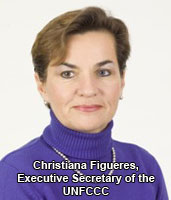 UN Secretary-General has appointed Christiana Figueres, of Costa Rica, as the new Executive Secretary of the United Nations Framework Convention on Climate Change (UNFCCC), replacing Yvo de Boer. UN Secretary-General has appointed Christiana Figueres, of Costa Rica, as the new Executive Secretary of the United Nations Framework Convention on Climate Change (UNFCCC), replacing Yvo de Boer.
In announcing her appointment, UN Secretary-General Ban Ki-moon stated, "Ms. Figueres is an international leader on strategies to address global climate change and brings to this position a passion for the issue, deep knowledge of the stakeholders and valuable hands-on experience with the public sector, non-profit sector and private sector. Ms. Figueres leadership at the helm of the UNFCCC comes at a crucial time in global efforts to take effective action on climate change."
Ms. Figueres has been a member of the Costa Rican negotiating team since 1995. She represented Latin America and the Caribbean on the Executive Board of the Clean Development Mechanism in 2007, and was then elected Vice President of the Conference of the Parties (to UNFCCC) 2008-2009. She has served as Director of International Cooperation in the Ministry of Planning in Costa Rica, and as Chief of Staff to the Minister of Agriculture. She was also the Director of Renewable Energy in the Americas (REIA) and is founder of the Center for Sustainable Development of the Americas (CSDA).
View May 17, 2010 UNFCCC press release
Visit UNFCCC website
Source: UNFCCC
 Since 2005, faith leaders from around the world have met in parallel to the G8 leaders'' summits. The 2010 Interfaith Summit takes place at University of Winnipeg, June 21-23. The interfaith leaders gather to challenge the G8 Nations to live up to previous commitments, especially in ways that based on compassion and hope. Since 2005, faith leaders from around the world have met in parallel to the G8 leaders'' summits. The 2010 Interfaith Summit takes place at University of Winnipeg, June 21-23. The interfaith leaders gather to challenge the G8 Nations to live up to previous commitments, especially in ways that based on compassion and hope.
The annual interfaith summit releases the Faith Leaders Statement. The Faith Leaders Statement underscores G 8 commitments to the Millennium Development Goals and processes that move toward equity and justice. As the G 8 has evolved into both G 8 and G20 meetings, the faith leaders have also addressed the G 20. The 2010 Faith Leaders Statement, A Time for Inspired Leadership and Action, calls on global leaders to:
- address immediate needs of the most vulnerable while simultaneously making structural changes to close the growing gap between rich and poor;
- prioritize long term environmental sustainability and halt climate change, while addressing its impacts on the poor;
- invest in peace and remove factors that feed cycles of violent conflict and costly militarism.
View World Religions Summit: Interfaith Leaders in the G8 Nations Website
View G8/G20 2010 Interfaith Partnership Online Petition
View Faith Leader''s Current and Previous Summit Statements
View United Nations Millennium Development Goals Website
Source: World Religions Summit Website
 The People's World Conference on Climate Change and the Rights of Mother Earth convened in Cochabamba, Bolivia, from 19-22 April 2010. The conference provided a forum to discuss the causes of climate change and propose measures that facilitate the well-being of mankind in harmony with nature. The People's World Conference on Climate Change and the Rights of Mother Earth convened in Cochabamba, Bolivia, from 19-22 April 2010. The conference provided a forum to discuss the causes of climate change and propose measures that facilitate the well-being of mankind in harmony with nature.
A 10-page Conference declaration calls on developed countries to take measures such as:
- committing to quantified emission reductions that will limit global temperature increase to a maximum of 1°C;
- bear the costs and ensure technology transfer necessary to compensate developing countries for lost development opportunities due to a compromised atmosphere;
- take responsibility for climate change migrants, through conclusion of an international agreement.
The declaration also urges approval of a second commitment period under the Kyoto Protocol in which developed countries commit to reduce domestic emissions by at least 50% against 1990 levels without resorting to market-based mechanisms. It further calls for recognition and integration of the UN Declaration on the Rights of Indigenous Peoples in climate change negotiations.
The final declaration foresees a second People's World Conference on Climate Change and the Rights of Mother Earth will be held in 2011 to discuss the results of Conference of the Parties (COP) 16 in Mexico City, December 2010.
View April 28, 2010 World People's Conference on Climate Change Declaration
View April 30, 2010 World People's Conference on Climate Change Declaration
View April 23, 2010 World People's Conference on Climate Change article
View April 19, 2010 BBC article
View April 18, 2010 Guardian article
View May 3, 2010 Common Dreams article
Source: IISD
The next round of formal UN climate change negotiations under the United Nations Framework Convention on Climate Change (UNFCCC) takes place in April in Bonn, German from Friday, 9 April through Sunday, 11 April 2010.
In addition two major negotiating sessions are currently scheduled for 2010: the 32nd session of the UNFCCC Convention subsidiary bodies from 31 May to 11 June 2010. The 16th Conference of the Parties (COP 16)/6th Conference of the Parties serving as the meeting of the Parties to the Kyoto Protocol (CMP 6) in Mexico from 29 November to 10 December 2010.
"Following the UN Climate Change Conference in Copenhagen, this constitutes a quick return to the negotiations," said UNFCCC Executive Secretary Yvo de Boer. "The decision to intensify the negotiating schedule underlines the commitment by governments to move the negotiations forward towards success in Cancun."
 Download February 23, 2010 UNFCCC Press Release (PDF) Download February 23, 2010 UNFCCC Press Release (PDF)
Source: UNFCCC
 Previously, the Commonwealth has suspended countries for human rights violations, but this at a Commonwealth summit in Trinidad and Tobago held in the last weekend of November, 2009, campaigners, politicians and scientists proposed to suspend Canada because of its climate policy. Previously, the Commonwealth has suspended countries for human rights violations, but this at a Commonwealth summit in Trinidad and Tobago held in the last weekend of November, 2009, campaigners, politicians and scientists proposed to suspend Canada because of its climate policy.
"Countries that fail to help (tackle global warming) should be suspended from membership, as are those that breach human rights," states Clare Short, the former International Development Secretary according to the Guardian.
"If the Commonwealth is serious about holding its members to account, then threatening the lives of millions of people in developing countries should lead to the suspension of Canada's membership immediately," states Saleemul Huq, a lead author for the Intergovernmental Panel on Climate Change.
Canada signed the Kyoto Protocol in 2000, pledging to reduce greenhouse gas emissions by six per cent from 1990 levels by the commitment period ending in 2012. By 2007, its emissions were 34 per cent above its reduction target.
Queen Elizabeth, as head of the Commonwealth, addressed the urgency of climate change negotiations in her opening remarks Friday;
"The threat to our environment is now a global challenge that will continue to affect the security and stability of millions for years to come."
British Prime Minister Gordon Brown proposed a 17.5 billion dollar fund as part of the future Copenhagen agreement to help poorer countries reduce greenhouse gases and adapt to climate change.
View November 27, 2009 COP15 article
View November 27, 2009 CBC article
Source: COP15.dk, CBC.ca
 The US and China announced a package of cooperative agreements including seven initiatives, partnerships, action plans and research centered on climate change strategies. These agreements follow the Asia-Pacific Economic Cooperation meeting where the US accepted the Danish proposal for finalizing an interm international climate agreement in Copenhagen in December. The US and China announced a package of cooperative agreements including seven initiatives, partnerships, action plans and research centered on climate change strategies. These agreements follow the Asia-Pacific Economic Cooperation meeting where the US accepted the Danish proposal for finalizing an interm international climate agreement in Copenhagen in December.
The US-China climate agreements included cooperation on green house gas inventory, joint clean energy research center, electric vehicle initiatives, energy efficiency framework, renewable energy development, developing clean coal energy technology, promotion of peaceful use of nuclear energy and development of public private partnerships on clean energy. China also signed an MOU with the US EPA to Build Capacity to Address Climate Change.
View November 17, 2009 Scientific American article
View November 17, 2009 Climate Progress press release
View November 19, 2009 EPA press release
View November 20, 2009 Climate Progress press release
 Download Memorandum of Cooperation between US and China (PDF) Download Memorandum of Cooperation between US and China (PDF)
Source: Climate Progress
 The fifth of a series of five major negotiating sessions under the United Nations Framework Convention on Climate Change (UNFCCC) leading up to the UN Climate Change Conference in Copenhagen was held in Barcelona, Spain from November 2nd to 6th, 2009. More than 4,500 participants, including delegates from 181 countries, took part in the meeting. The fifth of a series of five major negotiating sessions under the United Nations Framework Convention on Climate Change (UNFCCC) leading up to the UN Climate Change Conference in Copenhagen was held in Barcelona, Spain from November 2nd to 6th, 2009. More than 4,500 participants, including delegates from 181 countries, took part in the meeting.
Addressing the media on the final day of the negotiations, UNFCCC Executive Secretary Yvo de Boer said that progress had been made during the week and that he was confident that Copenhagen would deliver a strong deal. However, Yvo de Boer noted that little progress had been made on the two key issues of mid-term emission reduction targets of developed, countries and finance that would allow developing countries to limit their emissions growth and adapt to the inevitable effects of climate change.
"Without these two pieces of the puzzle in place, we will not have a deal in Copenhagen," States Yvo de Boer.
According to the Intergovernmental Panel on Climate Change, an aggregate emission reduction by industrialised countries of between minus 25% and 40% over 1990 levels would be required by 2020 in order to stave off the worst effects of climate change, with global emissions falling by at least 50% by 2050. Even under this scenario, there would be an only a 50% chance of avoiding the most catastrophic consequences.
The UN Climate Change Conference in Copenhagen, Denmark is set take place from December 7th to 18th, 2009.
Visit UNFCCC website
View Meeting Summary
 Download November 6, 2009 UNFCCC press release (PDF) Download November 6, 2009 UNFCCC press release (PDF)
Sources: UNFCCC, UNFCCC Press Release
 The fourth in a series of five major negotiating sessions under the United Nations Framework Convention on Climate Change (UNFCCC) leading up to the UN Climate Change Conference in Copenhagen was held in Bangkok, Thailand, September 28 to October 9, 2009. The negotiation session was attended by more than 4,000 participants, including government delegates from 177 countries, representatives from business and industry, environmental organisations and research institutions. The key goal of the meeting was to obtain clarity on further emission reduction commitments for industrialised countries. The fourth in a series of five major negotiating sessions under the United Nations Framework Convention on Climate Change (UNFCCC) leading up to the UN Climate Change Conference in Copenhagen was held in Bangkok, Thailand, September 28 to October 9, 2009. The negotiation session was attended by more than 4,000 participants, including government delegates from 177 countries, representatives from business and industry, environmental organisations and research institutions. The key goal of the meeting was to obtain clarity on further emission reduction commitments for industrialised countries.
For many, this round of negotiations ended with disappointment due to a lack of strong leadership by industrialized countries on global warming action. The main obstacles in the meetings were weak targets for rich countries and their failure to make firm commitments to support climate actions in developing countries.
"Countries primarily responsible for global warming in the first place, Canada included, have not followed through on their commitment to lead the way on climate change, and in fact are in danger of backtracking yet again," said Mark Lutes, from WWF International.
Stronger 2020 pollution reduction commitments were announced in Bangkok by Norway (40% reductions, strengthened from 30%) and Japan (25% reductions, strengthened from 8%).
"Canada's 3% reduction target is the weakest of any industrialized country and we have put no money on the table for the developing world," states Graham Saul, Climate Action Network-Reseau Action Climat.
View October 8, 2009 Climate Action Network news release
 Download UN Climate Change Talks - Bangkok 2009 Fact sheet (PDF) Download UN Climate Change Talks - Bangkok 2009 Fact sheet (PDF)
 Download September 28, 2009 UNFCCC press release (PDF) Download September 28, 2009 UNFCCC press release (PDF)
View Meeting Summary
Sources: Climate Action Network News Release, UN Climate Change Talks - Bangkok 2009 Fact sheet, UNFCCC Press Release
The G8 Group is an unofficial forum of the heads of the leading industrialized democracies (Russia, the U.S., Britain, France, Japan, Germany, Canada and Italy), where the European Commission is also represented and fully participates. The history of the Group, which initially had consisted of seven members, began in November 1975 & Canada joined the Group a year later.
G8 is not an international organization. It does not rest on an international agreement and does not have formal admission criteria, a charter or a permanent secretariat. Its decisions are formulated as the political commitments of the member states.
View University of Toronto's G8 Information Centre
2009 Climate Change G8 Declaration
 G8 leaders met July 8 - 10, 2008 in L'Aquila, Italy for the 2009 G8 Summit. Brazil, China, India, Mexico and South Africa - the so-called Group of Five (G5) - also participated as invited guests. G8 leaders met July 8 - 10, 2008 in L'Aquila, Italy for the 2009 G8 Summit. Brazil, China, India, Mexico and South Africa - the so-called Group of Five (G5) - also participated as invited guests.
Visit the 2009 G8 Summit website
The 2009 G8 Leaders Declaration: Responsible Leadership for a Sustainable Future was released July 8, 2009. It included statements on climate change, including paragraph 65, which
- recognizes "broad scientific view that the increase in global average temperature above pre industrial levels ought not to exceed 2°C"
- includes "the goal of achieving at least a 50% reduction of global emissions by 2050"
- acknowledges the 2050 goal means "global emissions need to peak as soon as possible and decline thereafter"
- specifies G8 nations "support a goal of developed countries reducing emissions of greenhouse gases in aggregate by 80% or more by 2050 compared to 1990 or more recent years"
- emphasizes "major emerging economies need to undertake quantifiable actions to collectively reduce emissions significantly below business-as-usual by a specified year"
 Download July 8, 2009 G8 Leaders Declaration: Responsible Leadership for a Sustainable Future (PDF) Download July 8, 2009 G8 Leaders Declaration: Responsible Leadership for a Sustainable Future (PDF)
G8 countries pushed G5 countries to agree that an increase in global temperatures shouldn't exceed two degrees Celsius. Emerging economy countries have so far, however, refused to commit to specific reduction targets.
UN Secretary General Ban Ki-moon called the G8's declaration on climate change unfair because it doesn't help developing countries to cut their own emissions, suggesting the G8 finance poorer nations to help them change their polluting growth pattern and adapt to the effects of global warming.
Some countries have refused to establish further commitments prior to the UN climate change conference in Copenhagen in December 2009. There has also been criticism that industrialized nations have not achieved midterm emissions reductions.
View July 9, 2009 CBC News article
WWF welcomed the leaders' initiative "but the lack of an agreement on ambitious midterm emissions reduction targets, clear financial commitments, and a date for global peak and decline of emissions could turn the 2 degree commitment into an empty statement".
WWF believes the group of industrialized countries should cut emissions by 40 percent by 2020 compared to 1990 levels.
View July 8, 2009 WWF press release
The Pembina Institute praised the G8 leaders' 2050 goal, but also noted missed opportunities.
'G8 leaders recognized today that global warming should not exceed the science-based limit of 2°C. For the first time, the declaration also includes the goal that developed countries will reduce their emissions of greenhouse gases in aggregate by 80 per cent or more by 2050 compared to 1990 or more recent years.'
'Overall, the G8 declaration is a mixed effort on climate change. It misses critical opportunities to make progress on mid-term targets for 2020 and financial support for climate action in developing countries. These gaps mean it is likely too weak to move the Copenhagen talks forward significantly, as developing countries hoped the G8 would do.'
View July 8, 2009 Pembina Institute press release
Canada's Climate Plan and Emissions Targets
According to the Pembina Institute, the 2009 G8 declaration 'puts new and urgent pressure on Canada to strengthen its national emission targets.'
- Canada's current 2050 greenhouse gas emissions reduction target is equivalent to a reduction of just 51%-64% relative to 1990 levels.
- Even using the government's own 2006 baseline, Canada's 60%-70% reduction target falls short of the G8 target of an 80% reduction by 2050 for industrialized nations.
Climate Action Network Canada urges Canada and G8 nations to step up with climate financing for developing countries.
View July 9, 2009 Climate Action Network Canada press release
View July 9, 2009 Toronto Sun article
Source: 2009 G8 Summit, CBC, WWF, Pembina Institute, Toronto Sun, CAN-RAC
Canada Ranks Last in 2009 WWF Scorecard
Canada has never topped the WWF's list as a climate change leader, but this year it reached an all time low, according to the annual G8 Climate Scorecard. Canada ranks last among Germany, France, Italy, Japan, Russia, the U.K. and the U.S. The U.S. moved up in the annual rankings based on recent climate initiatives by the Obama administration. The report also includes rankings for five major developing countries.
Canada is identified as
- one of the few G8 nations whose emissions are still increasing, due in large part to expanding the tar sands
- having the highest per-capita emissions in the G8, along with sixth-place Russia
- having developed a plan to curb emissions last year that has not been implemented
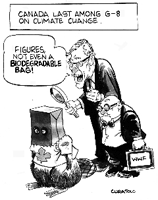
By Fred Curatolo
larger version |
The G8 Climate Scorecards 2009 was carried out by Ecofys for the conservation organization WWF and the global insurance firm Allianz SE. The report measures countries' performance and trends related to action on climate change in areas such as:
- change in greenhouse gas emissions since 1990
- progress on meeting targets under the Kyoto Protocol
- use of renewable energy sources as a share of energy use
- the efficiency of climate and energy policies
|
Overall, the Scorecard's message is that some countries have made commendable efforts, but action remains insufficient to set the world on a low carbon economy course.
Germany, the United Kingdom and France have already achieved their Kyoto targets but according to climate science, those efforts won't be enough to keep the global temperatures below the danger threshold – defined as a two-degree rise of average temperatures around the planet, when compared to pre-industrial times.
WWF says that to prevent climate change from reaching these danger levels, global emissions must peak and decline well before 2020 and be reduced by 80% by 2050.
View WWF's 2009 G8 Climate Scorecard
 Download WWF's full report (PDF) Download WWF's full report (PDF)
 Download Executive Summary of WWF's 2009 G8 Climate Scorecard (JPG) Download Executive Summary of WWF's 2009 G8 Climate Scorecard (JPG)
View July 1, 2009 WWF Canada press release
View July 2, 2009 CTV article
View July 1, 2009 Calgary Herald article
View July 1, 2009 CBC News article
Source: WWF, CTV, Calgary Herald, CBC News
|


 Download WWF's full report (PDF)
Download WWF's full report (PDF)
 Download Executive Summary of WWF's 2009 G8 Climate Scorecard (JPG)
Download Executive Summary of WWF's 2009 G8 Climate Scorecard (JPG)
 2002-2014
2002-2014


 International leaders have reached a pact to keep global warming "well under" two degrees, and "pursue efforts" to limit temperature rises to 1.5 degrees. French foreign minister Laurent Fabius, Chair of COP 21, said the deal would be legally-binding, and that targets would be reviewed every five years.
International leaders have reached a pact to keep global warming "well under" two degrees, and "pursue efforts" to limit temperature rises to 1.5 degrees. French foreign minister Laurent Fabius, Chair of COP 21, said the deal would be legally-binding, and that targets would be reviewed every five years.
 The first week of Paris United Nations negotiations for a new international climate agreement is over. Environment ministers from many of the 190 countries attending are participating in week two negotiations.
The first week of Paris United Nations negotiations for a new international climate agreement is over. Environment ministers from many of the 190 countries attending are participating in week two negotiations.
 The latest round of climate talks just concluded in Lima, Peru (COP 20) after two days of overtime negotiations. A new document was created, the Lima Call for Climate Action that sets up framework for negotiations on a new climate treaty that will be decided in Paris next year. A binding global climate treaty that supports real change will depend on reaching agreements with the 20 nations that emit 80% of total global greenhouse emissions (GHG), and the economic sectors that have the biggest impact on the world’s climate.
The latest round of climate talks just concluded in Lima, Peru (COP 20) after two days of overtime negotiations. A new document was created, the Lima Call for Climate Action that sets up framework for negotiations on a new climate treaty that will be decided in Paris next year. A binding global climate treaty that supports real change will depend on reaching agreements with the 20 nations that emit 80% of total global greenhouse emissions (GHG), and the economic sectors that have the biggest impact on the world’s climate.
 This December, 195 nations plus the European Union are meeting in Lima for two weeks for the crucial UN Conference of the Parties on Climate Change, known as COP 20. They aim to draft language for the next international climate agreement.
This December, 195 nations plus the European Union are meeting in Lima for two weeks for the crucial UN Conference of the Parties on Climate Change, known as COP 20. They aim to draft language for the next international climate agreement.
 In advance of the November 2010 G20 meeting in South Korea, the G20 meeting in South Korea 18 leading Canadian organizations called on Prime Minister Harper and Minister Flaherty to follow through on their G20 promise to end tax breaks to fossil fuel companies.
In advance of the November 2010 G20 meeting in South Korea, the G20 meeting in South Korea 18 leading Canadian organizations called on Prime Minister Harper and Minister Flaherty to follow through on their G20 promise to end tax breaks to fossil fuel companies. The fourth round of the 2010 United Nations (UN) climate change negotiations took place October 4th to 9th in Tianjin, China. The Tianjin UN Climate Change Conference is designed to prepare draft outcomes the for UN Climate Change Conference in Cancun, Mexico November and December 2010.
The fourth round of the 2010 United Nations (UN) climate change negotiations took place October 4th to 9th in Tianjin, China. The Tianjin UN Climate Change Conference is designed to prepare draft outcomes the for UN Climate Change Conference in Cancun, Mexico November and December 2010. View the full NOAA Global Climate Dashboard
View the full NOAA Global Climate Dashboard Delegates representing governments, intergovernmental and non-governmental organizations, academia, private sectors and media met three times in Bonn Germany between April and August 2010 to negotiate climate treaty language in advance of December 2010 Conference of the Parties negotiations. These bring together draft language for specific treaty contents in the lead up to the next United Nations Framework Convention on Climate Change (UNFCCC)sessions in Cancún, Mexico, November 29-December 10 2010. The negotiations are to prepare for the expiration of the Kyoto Protocol in 2012.
Delegates representing governments, intergovernmental and non-governmental organizations, academia, private sectors and media met three times in Bonn Germany between April and August 2010 to negotiate climate treaty language in advance of December 2010 Conference of the Parties negotiations. These bring together draft language for specific treaty contents in the lead up to the next United Nations Framework Convention on Climate Change (UNFCCC)sessions in Cancún, Mexico, November 29-December 10 2010. The negotiations are to prepare for the expiration of the Kyoto Protocol in 2012. United Nations Human Rights Council (UNHRC, herein HRC), an intergovernmental body of the United Nations General Assembly, has endorsed a resolution that the next Social Forum working days in Geneva during October 2010 will focus on the negative effects climate change will have on the full enjoyment of human rights.
United Nations Human Rights Council (UNHRC, herein HRC), an intergovernmental body of the United Nations General Assembly, has endorsed a resolution that the next Social Forum working days in Geneva during October 2010 will focus on the negative effects climate change will have on the full enjoyment of human rights. UN Secretary-General has appointed Christiana Figueres, of Costa Rica, as the new Executive Secretary of the United Nations Framework Convention on Climate Change (UNFCCC), replacing Yvo de Boer.
UN Secretary-General has appointed Christiana Figueres, of Costa Rica, as the new Executive Secretary of the United Nations Framework Convention on Climate Change (UNFCCC), replacing Yvo de Boer. Since 2005, faith leaders from around the world have met in parallel to the G8 leaders'' summits. The 2010 Interfaith Summit takes place at University of Winnipeg, June 21-23. The interfaith leaders gather to challenge the G8 Nations to live up to previous commitments, especially in ways that based on compassion and hope.
Since 2005, faith leaders from around the world have met in parallel to the G8 leaders'' summits. The 2010 Interfaith Summit takes place at University of Winnipeg, June 21-23. The interfaith leaders gather to challenge the G8 Nations to live up to previous commitments, especially in ways that based on compassion and hope. The People's World Conference on Climate Change and the Rights of Mother Earth convened in Cochabamba, Bolivia, from 19-22 April 2010. The conference provided a forum to discuss the causes of climate change and propose measures that facilitate the well-being of mankind in harmony with nature.
The People's World Conference on Climate Change and the Rights of Mother Earth convened in Cochabamba, Bolivia, from 19-22 April 2010. The conference provided a forum to discuss the causes of climate change and propose measures that facilitate the well-being of mankind in harmony with nature. Previously, the Commonwealth has suspended countries for human rights violations, but this at a Commonwealth summit in Trinidad and Tobago held in the last weekend of November, 2009, campaigners, politicians and scientists proposed to suspend Canada because of its climate policy.
Previously, the Commonwealth has suspended countries for human rights violations, but this at a Commonwealth summit in Trinidad and Tobago held in the last weekend of November, 2009, campaigners, politicians and scientists proposed to suspend Canada because of its climate policy. The US and China announced a package of cooperative agreements including seven initiatives, partnerships, action plans and research centered on climate change strategies. These agreements follow the Asia-Pacific Economic Cooperation meeting where the US accepted the Danish proposal for finalizing an interm international climate agreement in Copenhagen in December.
The US and China announced a package of cooperative agreements including seven initiatives, partnerships, action plans and research centered on climate change strategies. These agreements follow the Asia-Pacific Economic Cooperation meeting where the US accepted the Danish proposal for finalizing an interm international climate agreement in Copenhagen in December. The fifth of a series of five major negotiating sessions under the United Nations Framework Convention on Climate Change (UNFCCC) leading up to the UN Climate Change Conference in Copenhagen was held in Barcelona, Spain from November 2nd to 6th, 2009. More than 4,500 participants, including delegates from 181 countries, took part in the meeting.
The fifth of a series of five major negotiating sessions under the United Nations Framework Convention on Climate Change (UNFCCC) leading up to the UN Climate Change Conference in Copenhagen was held in Barcelona, Spain from November 2nd to 6th, 2009. More than 4,500 participants, including delegates from 181 countries, took part in the meeting. The fourth in a series of five major negotiating sessions under the United Nations Framework Convention on Climate Change (UNFCCC) leading up to the UN Climate Change Conference in Copenhagen was held in Bangkok, Thailand, September 28 to October 9, 2009. The negotiation session was attended by more than 4,000 participants, including government delegates from 177 countries, representatives from business and industry, environmental organisations and research institutions. The key goal of the meeting was to obtain clarity on further emission reduction commitments for industrialised countries.
The fourth in a series of five major negotiating sessions under the United Nations Framework Convention on Climate Change (UNFCCC) leading up to the UN Climate Change Conference in Copenhagen was held in Bangkok, Thailand, September 28 to October 9, 2009. The negotiation session was attended by more than 4,000 participants, including government delegates from 177 countries, representatives from business and industry, environmental organisations and research institutions. The key goal of the meeting was to obtain clarity on further emission reduction commitments for industrialised countries. G8 leaders met July 8 - 10, 2008 in L'Aquila, Italy for the 2009 G8 Summit. Brazil, China, India, Mexico and South Africa - the so-called Group of Five (G5) - also participated as invited guests.
G8 leaders met July 8 - 10, 2008 in L'Aquila, Italy for the 2009 G8 Summit. Brazil, China, India, Mexico and South Africa - the so-called Group of Five (G5) - also participated as invited guests.